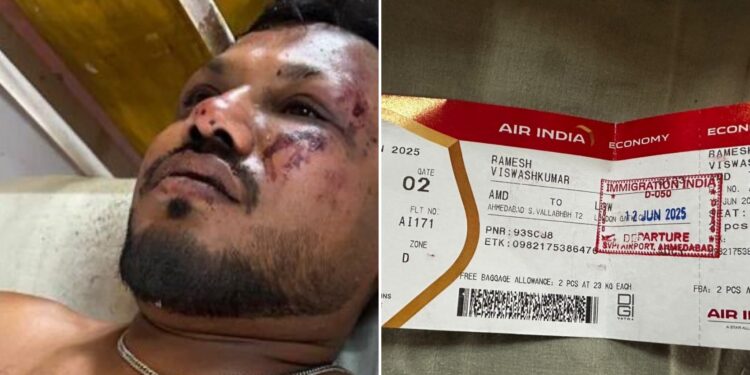On June 12, 2025, the skies above Ahmedabad, India, turned catastrophic as Air India Flight 171, a Boeing 787-8 Dreamliner bound for London Gatwick, crashed mere minutes after takeoff. The flight, carrying 230 passengers and 12 crew members, plummeted into a medical college hostel in the densely populated Meghani Nagar area, claiming at least 204 lives, including those on the ground. Amid the wreckage and heartbreak, one man, 38-year-old Ramesh Vishwaskumar, a British national originally from Daman and Diu, emerged as the lone survivor from the aircraft, defying the odds in a tragedy that has gripped the nation.
The crash occurred shortly after the plane departed Sardar Vallabhbhai Patel International Airport. Eyewitnesses reported a loud explosion followed by a fireball as the aircraft struck the hostel, reducing parts of the building to rubble. Emergency services rushed to the scene, battling flames and navigating debris to rescue survivors and recover bodies. Initial reports from Ahmedabad Police Commissioner G.S. Malik indicated no survivors from the plane, but hours later, Ramesh’s survival came to light, sparking both hope and disbelief.
Ramesh, seated in seat 11A, recounted a harrowing tale of survival. “I heard a loud bang, and the plane started shaking violently,” he told authorities from his hospital bed, where he was treated for chest, eye, and foot injuries. “I don’t know how I got out—maybe through a window. It all happened so fast.” Video footage circulating on social media showed Ramesh staggering away from the smoldering wreckage, bloodied but alive. He mentioned his brother, seated elsewhere on the flight, remains unaccounted for, adding a personal layer of tragedy to his survival.
The crash’s impact extended beyond the aircraft, with the medical college hostel housing students and staff suffering significant casualties. The death toll, initially estimated at 120, rose to at least 204 as recovery efforts continued, with fears that the number could climb further.
Ramesh’s survival has become a focal point of the tragedy. A former resident of Daman and Diu, he had been visiting family in India before boarding the flight to return to London. His escape, possibly through an emergency exit, is being studied by investigators to understand how he survived an impact that obliterated much of the aircraft.
As the investigation unfolds, questions linger about the crash’s cause and the circumstances that allowed Ramesh to survive. Was it a mechanical failure, human error, or an external factor? The AAIB’s findings will be critical in preventing future tragedies.
For now, Ramesh Vishwaskumar remains a symbol of resilience, a lone beacon of hope in a disaster that has left India and the world mourning.






























